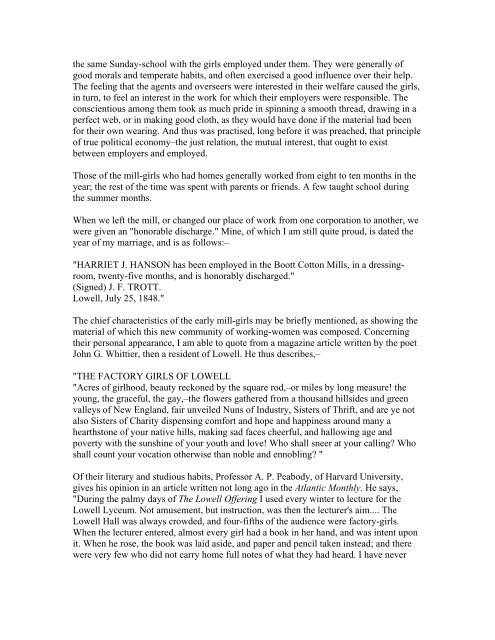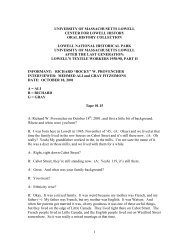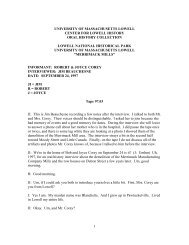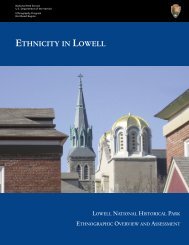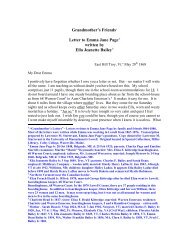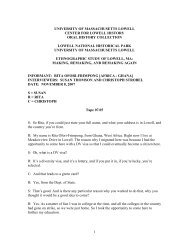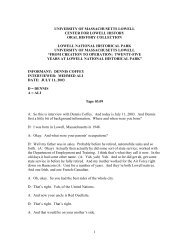LOOM AND SPINDLE OR Life Among the Early Mill Girls WITH A ...
LOOM AND SPINDLE OR Life Among the Early Mill Girls WITH A ...
LOOM AND SPINDLE OR Life Among the Early Mill Girls WITH A ...
You also want an ePaper? Increase the reach of your titles
YUMPU automatically turns print PDFs into web optimized ePapers that Google loves.
<strong>the</strong> same Sunday-school with <strong>the</strong> girls employed under <strong>the</strong>m. They were generally of<br />
good morals and temperate habits, and often exercised a good influence over <strong>the</strong>ir help.<br />
The feeling that <strong>the</strong> agents and overseers were interested in <strong>the</strong>ir welfare caused <strong>the</strong> girls,<br />
in turn, to feel an interest in <strong>the</strong> work for which <strong>the</strong>ir employers were responsible. The<br />
conscientious among <strong>the</strong>m took as much pride in spinning a smooth thread, drawing in a<br />
perfect web, or in making good cloth, as <strong>the</strong>y would have done if <strong>the</strong> material had been<br />
for <strong>the</strong>ir own wearing. And thus was practised, long before it was preached, that principle<br />
of true political economy–<strong>the</strong> just relation, <strong>the</strong> mutual interest, that ought to exist<br />
between employers and employed.<br />
Those of <strong>the</strong> mill-girls who had homes generally worked from eight to ten months in <strong>the</strong><br />
year; <strong>the</strong> rest of <strong>the</strong> time was spent with parents or friends. A few taught school during<br />
<strong>the</strong> summer months.<br />
When we left <strong>the</strong> mill, or changed our place of work from one corporation to ano<strong>the</strong>r, we<br />
were given an "honorable discharge." Mine, of which I am still quite proud, is dated <strong>the</strong><br />
year of my marriage, and is as follows:–<br />
"HARRIET J. HANSON has been employed in <strong>the</strong> Boott Cotton <strong>Mill</strong>s, in a dressingroom,<br />
twenty-five months, and is honorably discharged."<br />
(Signed) J. F. TROTT.<br />
Lowell, July 25, 1848."<br />
The chief characteristics of <strong>the</strong> early mill-girls may be briefly mentioned, as showing <strong>the</strong><br />
material of which this new community of working-women was composed. Concerning<br />
<strong>the</strong>ir personal appearance, I am able to quote from a magazine article written by <strong>the</strong> poet<br />
John G. Whittier, <strong>the</strong>n a resident of Lowell. He thus describes,–<br />
"THE FACT<strong>OR</strong>Y GIRLS OF LOWELL<br />
"Acres of girlhood, beauty reckoned by <strong>the</strong> square rod,–or miles by long measure! <strong>the</strong><br />
young, <strong>the</strong> graceful, <strong>the</strong> gay,–<strong>the</strong> flowers ga<strong>the</strong>red from a thousand hillsides and green<br />
valleys of New England, fair unveiled Nuns of Industry, Sisters of Thrift, and are ye not<br />
also Sisters of Charity dispensing comfort and hope and happiness around many a<br />
hearthstone of your native hills, making sad faces cheerful, and hallowing age and<br />
poverty with <strong>the</strong> sunshine of your youth and love! Who shall sneer at your calling? Who<br />
shall count your vocation o<strong>the</strong>rwise than noble and ennobling? "<br />
Of <strong>the</strong>ir literary and studious habits, Professor A. P. Peabody, of Harvard University,<br />
gives his opinion in an article written not long ago in <strong>the</strong> Atlantic Monthly. He says,<br />
"During <strong>the</strong> palmy days of The Lowell Offering I used every winter to lecture for <strong>the</strong><br />
Lowell Lyceum. Not amusement, but instruction, was <strong>the</strong>n <strong>the</strong> lecturer's aim.... The<br />
Lowell Hall was always crowded, and four-fifths of <strong>the</strong> audience were factory-girls.<br />
When <strong>the</strong> lecturer entered, almost every girl had a book in her hand, and was intent upon<br />
it. When he rose, <strong>the</strong> book was laid aside, and paper and pencil taken instead; and <strong>the</strong>re<br />
were very few who did not carry home full notes of what <strong>the</strong>y had heard. I have never


